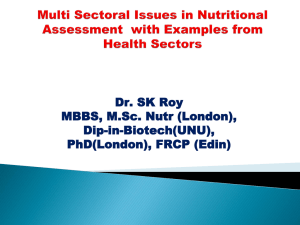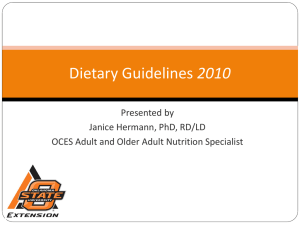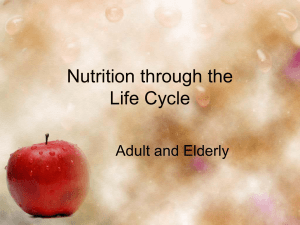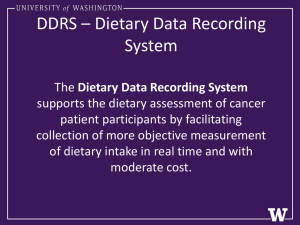CMS2014DIETARYTJC - Arkansas Hospital Association
advertisement
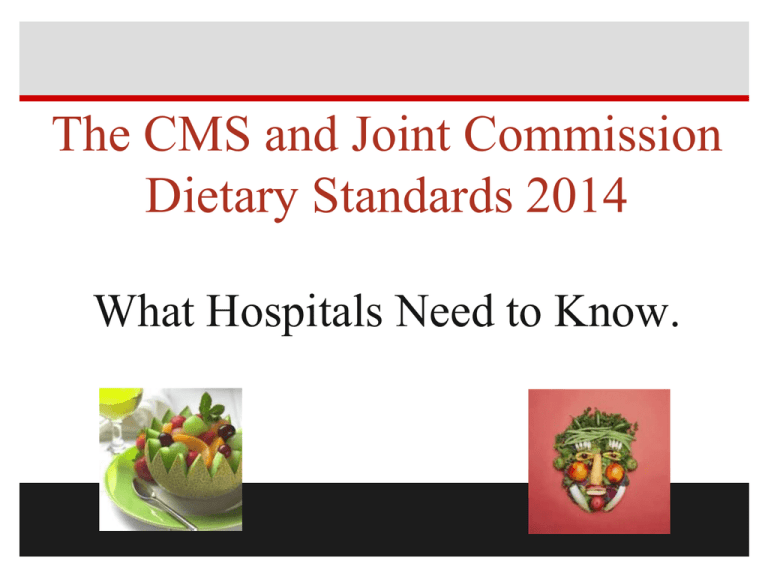
The CMS and Joint Commission Dietary Standards 2014 What Hospitals Need to Know. Speaker Sue Dill Calloway RN, Esq. CPHRM AD, BA, BSN, MSN, JD President of Patient Safety and Education Consulting Board Member Emergency Medicine Patient Safety Foundation www.empsf.org 614 791-1468 sdill1@columbus.rr.com 2 The CMS Conditions of Participation (CoPs) for Dietary and Nutrition Services 3 CMS CoP The Centers for Medicare and Medicaid Services is called CMS for short CMS has a manual called the Conditions of Participation or CoPs Every hospital that received Medicare or Medicaid reimbursement must follow this CoP manual There is a separate manual for PPS hospitals and one for critical access hospitals (CAH) Must follow these for all patients and not just Medicare or Medicaid patients 4 You Don’t Want One of These from CMS 5 CMS Hospital CoPs All Interpretative guidelines are in the state operations manual and are found at this website1 Appendix A, Tag A-0001 to A-1164 and 456 pages long You can look up any tag number under this manual Food and Dietetic Services starts at tag A-0618 Manuals Manuals are now being updated more frequently Still need to check survey and certification and transmittals website once a month to keep up on new changes 2 1 http://www.cms.hhs.gov/manuals/downloads/som107_Appendicestoc.pdf 2 http://www.cms.gov/Transmittals/01_overview.asp 6 New website at www.cms.hhs.gov/manuals/downloads/som107_Appendixtoc.pdf 7 CMS Hospital CoP Manual www.cms.hhs.gov/ma nuals/downloads/som 107_Appendixtoc.pdf 8 Survey Procedure Step one is publication in Federal Register Step two is where CMS publishes the interpretive guidelines The interpretive guidelines provide instructions to the surveyors on how to survey the CoPs These are called survey procedure Not all the standards have survey procedures Questions such as “Ask patients to tell you if the hospital told them about their rights” 9 CMS Survey and Certification Website www.cms.gov/SurveyCertific ationGenInfo/PMSR/list.asp# TopOfPage Click on Policy & Memos 10 Access to Hospital Complaint Data CMS issued Survey and Certification memo on March 22, 2013 regarding access to hospital complaint data Includes acute care and CAH hospitals Does not include the plan of correction but can request Questions to bettercare@cms.hhs.com This is the CMS 2567 deficiency data and lists the tag numbers Will update quarterly Available under downloads on the hospital website at www.cms.gov 11 Access to Hospital Complaint Data There is a list that includes the hospital’s name and the different tag numbers that were found to be out of compliance Many on restraints and seclusion, EMTALA, infection control, patient rights including consent, advance directives and grievances and standing orders Two websites by private entities also publish the CMS nursing home survey data and hospitals The ProPublica website for LTC The Association for Health Care Journalist (AHCJ) websites for hospitals 12 Access to Hospital Complaint Data 13 Updated Deficiency Data Reports www.cms.gov/Medicare/Provider-Enrollment-andCertification/CertificationandComplianc/Hospitals.html 14 Dietary Deficiencies Nov 2013 & Jan 2014 Section Tag Number Number Nov 2013 Jan 2014 Food & Dietetic Services 618 10 11 Organization 619 6 6 Director of Dietary Services 620 17 18 Qualified Director 621 8 8 Competent Staff 622 6 6 Diets 628 11 11 Therapeutic Diet 629 5 5 Diets 630 16 16 Diet Manual 631 6 Total 87 6 15 CMS Proposed Changes February 4, 2013 CMS published some proposed changes on February 4, 2013 Published at : www.ofr.gov/inspection.aspx Says will save healthcare providers $676 million annually and 3.4 billion over five years Several are important to the dietary guidelines Would permit registered dietitians to order patient diets independently, which they are trained to do, without requiring the supervision or approval of a physician or other practitioner 16 CMS Proposed Changes February 4, 2013 CMS is proposing to include qualified dieticians (RD) as a practitioner who may be privileged to order patient diets (TPN, supplemental feedings and therapeutic diets) CMS said this would free up time for physicians and other practitioners to care for patients New language: (1) Individual patient nutritional needs must be met in accordance with recognized dietary practices. (2) All patient diets, including therapeutic diets, must be ordered by a practitioner responsible for the care of the patient, or by a qualified dietician as authorized by the medical staff and in accordance with State law. 17 www.ofr.gov/inspection.aspx. 18 CMS Proposed Changes February 4, 2013 CMS said it came to their attention that CMS CoPs were too restrictive and lacked the flexibility to allow hospitals to extend privileges to RD in accordance with state law CMS believes RD are best qualified to assess patient’s nutritional treatment plan and design and implement a nutritional treatment plan in consult with the care team Used the term qualified dieticians as not all states called them RD and some states call them licensed dieticians (LD) 19 Sample Page from CMS Manual 20 Food and Dietetic Services 618 Food and dietetic services section starts at tag 618 Hospital must have organized dietary services Must be directed and staffed by qualified personnel If contract with outside company need to have dietician and maintain minimum standards and provide for liaison with MS on recommendations on dietary policies See contract management standards tag 83-86 Dietary services must be organized to ensure nutritional needs of the patient are met in accordance with physician orders and acceptable standard of practice (common problematic standard) 21 Dietary Policies Required A-618 Need the following 7 policies: Availability of diet manual and therapeutic diet menus – Sometimes called Nutrition Care Manual (NCM) or Pediatric Nutrition Care Manual (PNCM) Frequency of meals served System for diet ordering and patient tray delivery Accommodation of non-routine occurrences – Parenteral nutrition (tube feeding), TPN, peripheral parenteral nutrition, changes in diet orders, early/late trays, nutritional supplements etc. 22 Seven Dietary Policies Required 618 Integration of food and dietetic services into hospital wide QAPI and infection control programs Guidelines on acceptable hygiene practices of personnel Guidelines for kitchen sanitation Important to protect against germs and bacteria that cause illness Compliance with state or federal laws 23 So What’s in Your Diet Manual? 24 So What’s in Your Diet Manual? 25 26 Diet Manual 27 Sanitation Guidelines 28 CDC Food Safety Website www.cdc.gov/foodsafety/ 29 FDA Center for Food Safety Website www.fda.gov/Food/default.htm 30 Get FSMA Updates by Mail /SMA/default.htm www.fda.gov/Food/FoodSafety/FSMA/default.htm Every year, 1 out of 6 people in the United States—48 million people--suffers from food borne illness, more than a . hundred thousand are hospitalized, and thousands die.die 31 FDA Guidance & Regulations Documents www.fda.gov/food/ guidanceregulation /default.htm 32 USDA Nutrient Database http://ndb.nal.usda.gov/ 33 Food Safety Website 34 State Public Health Departments 35 State Agriculture Departments www.foodsafety.gov/about/state/ind ex.html 36 37 CDC Guidelines for Environmental IC www.cdc.gov/mmwr/preview/ mmwrhtml/rr5210a1.htm 38 CDC Environmental Infection Control www.cdc.gov/mmwr/preview/mmwrhtm l/rr5210a1.htm 39 Dietary 618 Must comply with all state or federal laws Most states have a specific state law on food sanitation rules Same standard applies whether food and dietetic services are provided directly or through a contract CMS and Joint Commission have a separate section on contracted services Hospital needs to make sure are performed appropriately Contracted services are evaluated through the PI process Contract sections start at CMS tag 83 and TJC LD.04.03.09 with 10 elements of performance 40 State Specific Food Sanitation Rules Oregon http://arcweb.sos.state.or.us/rules/OARs _300/OAR_333/333_150.html 41 Organization A-0620 Must have full time director of food and dietetic services who is responsible for daily management of dietary services Must be granted authority and delegation by the Board and MS for the operation of dietary services and this should include Training programs for dietary staff and ensuring P&Ps are followed Daily management of dietary Make sure the P&P on next slide are followed So the job description should be position specific and clearly delineate this authority for direction of food and dietary services 42 Dietary Policies A-0620 Safety practices for food handling Emergency food supplies Orientation, work assignment, supervision of work and personnel performance Menu planning Purchase of foods and supplies Retention of essential records (cost, menus, training records, QAPI reports) Service QAPI program 43 Dietician Qualifications 620 The director must demonstrate through education, experience, and training that he or she is qualified to manage the department The director’s education, experience and training must be appropriate to the scope and complexity of the food service operation Surveyor is to verify the director is a full time employee Surveyor is to review their job description Surveyor is to make sure he or she has the necessary education, experience, and training to manage dietary 44 Dietitian 621 Qualified dietician must supervise nutritional aspects of patient care Responsibilities include: Approve patient menus and nutritional supplements Patient and family dietary counseling Perform and document nutritional assessments Evaluate patient tolerance to therapeutic diets when appropriate Collaborate with other services (MS, nursing, pharmacy, social work) Maintain data to recommend, prescribe therapeutic diets 45 Dietitian 621 If qualified dietician does not work full time, need to be sure there is adequate provisions for dietary consultations Frequency of consultations depends on the total number of patients and their nutritional needs Surveyor is to make sure that the total number of hours is appropriate to serve the needs of the patients Must ensure adequate coverage when the dietician is not available 46 Qualified Dietary Staff 622 Must have administrative and technical personnel competent in their duties Ensure staff is competent through education, experience and specialized training Personnel files should include documentation that the staff member is competent 47 Diets 628 Menus must meet the needs of the patient Menus must be nutritional, balanced Menus must meet the special needs of patients Current menus should be posted in the kitchen Screening criteria should be developed to determine what patients are at risk Once patient is identified nutritional assessment should be done (TJC PC.01.02.01) Patient should be re-evaluated as necessary to ensure their nutritional needs are met 48 Nutritional Assessment 628 TJC requires to be done within 24 hours by nursing (PC.01.02.03) CMS has a good list of examples of patients who may require a nutritional assessment: If requires artificial nutrition by any means (tube feeding, TPN, or peripheral parental nutrition) If medical or surgical condition interferes with ability to digest, absorb, or ingest nutrients 49 Nutritional Assessment 628 If diagnosis or signs and symptoms indicate a compromised nutritional status Such as anorexia, bulimia, electrolyte imbalance, dysphasia, malabsorption, ESRD etc. Patients adversely affected by their nutritional intake – Diabetes, CHF, taking certain medications, renal disease, etc Patients who refuse food should be offered substitutes of equal nutritional value to meet their basic nutritional needs 50 Nutritional Assessment Form 51 52 Nutritional Care Process Academy of N&D www.eatright.org/HealthProfessi onals/content.aspx?id=5902 53 Therapeutic Diets 629 Therapeutic diets must be prescribed by practitioner in writing by the practitioner responsible for patient’s care Dietician can make recommendations but diet must be ordered by doctor Document in the MR including information about the patient’s tolerance Evaluate for nutritional adequacy Manual must be available for nursing, FS, and medical staff 54 Therapeutic Diets 629 Dietician may assess a patient’s nutritional needs and provide consultations or recommendations Nurse or dietician should call the physician to get the order and write it as a verbal order in the chart CMS says if doctor writes that the dietician to write the order for the therapeutic diet this will be permissible Doctor can sign off order Unfortunately, a few state do not permit this holding it is outside the state scope of practice for a registered dietician 55 Nutritional Needs 630 Nutritional needs must be met in accordance with recognized dietary practices and in accordance with orders of the practitioner Follow recommended dietary allowances -current Recommended Dietary Allowances (RDA) or Dietary Reference Intake (DRI) of Food and Nutritional Board of the National Research Council “Dietary Guidelines for Americans 2011”1 Surveyor will ask hospital what national standard you are using 1www.dietaryguidelines.gov 56 Dietary Guidelines for Americans 57 Table of Contents Dietary Guidelines 58 Now Healthy Plate 59 www.choosemyplate.gov 60 Dietary Guidelines for Americans USDA and Health and Human Services announced the release of the Dietary Guidelines to help Americans make healthier food choices More than 1/3 of children and 2/3 of adults are overweight or obese Americans need to reduce the risk of developing diet related chronic diseases Has 23 key dietary recommendations and six recommendation for specific populations such as women who are pregnant 61 Dietary Guideline Recommendations Enjoy your food, but eat less. Avoid oversized portions. Make half your plate fruits and vegetables. Switch to fat-free or low-fat (1%) milk. Compare sodium in foods like soup, bread, and frozen meals – and choose the foods with lower numbers. Drink water instead of sugary drinks. 62 Press Release for Dietary Guidelines 2011 63 See also healthfinder.gov 64 Nutritional Needs Survey Procedure 630 Surveyor is suppose to ask the hospital to show them what national standard they are using Surveyor to view patient medical records to verify diet orders are provided as prescribed by the practitioner Surveyor is to determine if patient’s nutritional needs have been met Will determine if dietary intake and nutritional status is being monitored 65 Diet Manual 631 A current therapeutic diet manual must be readily available to all medical, nursing, and food service personnel The manual must be approved by the dietitian and medical staff The diet manual can not be more than five years old The therapeutic diet manual must be available to all medical, nursing, and food service staff Diet manual must be in accordance with current standards and include types of diets routinely ordered 66 Joint Commission Provision of Care Chapter Related to Dietary Introduction to the PC Chapter The Provision of Care, Treatment, and Services Chapter is referred to as the PC standards There are 48 standards It is a very important standard and focuses on care delivered to meet patient needs and includes some dietary standards There are four core parts of the care process: assessing patient needs, planning, providing, and coordinating care, treatment and services Interventions can be based on the plan of care 68 Time Frames for Assessment PC.01.02.03 EP1 The time frame for the initial nursing assessment needs to be in writing In accordance with law and regulation References RC.01.03.01 EP1 that requires the hospital to have a written policy the requires the timely entry of information into the medical record like the initial assessment EP2 The assessment must actually be done within this time frame specified References RC.01.02.03 EP2 which requires this be documented in the medical record timely 69 Time Frames for Assessment PC.01.02.03 EP7 A nutritional screen is done when warranted by the patient’s need within 24 hours after admission Nurse does initial screens for nutrition risk and consult dietician Screening criteria might include weight loss, poor intake prior to admission, chewing or swallowing problems, skin breakdown, aspiration problems, nutrition support, NPO, certain diagnosis etc. CMS has criteria to use in determining when dietician should be consulted 70 Nutrition Screen 71 Food and Nutrition PC.02.02.03 Standard: The hospital makes food and nutrition products available to its patients Food and nutrition services is hit hard during the CMS and TJC survey TJC has a dietary and nutrition tracer which is very detailed Important to pay attention to make sure the patient is eating their meals EP1 The hospital assigns responsibility for the safe and accurate provision of food and nutrition products 72 Food and Nutrition PC.02.02.03 Hospital has a dietician to run the food and nutrition program EP6 Prepares food and nutrition products using proper sanitation, temperature, light, moisture, ventilation, and security Food must be cooked in hot enough temperature to kill bacteria and other food borne diseases, hand hygiene Most states have specific regulation on this Don’t want meat on top to drip on food below in the refrigerator, clean can openers, hair restraints Cutting boards must be appropriate cleaned 73 Food and Nutrition PC.02.02.03 EP7 Food and nutrition products are consistent with each patient’s care EP8 Must accommodate a patient’s special diet and altered diet unless contraindicated Many patients have special diets such as 1500 calorie ADA or 2 gram low sodium diet EP9 Accommodates the patient’s cultural, religious, or ethnic food and nutrition preferences Unless contraindicated When possible 74 Food and Nutrition PC.02.02.03 EP10 When a patient refuses food, the hospital offers substitutes of equal nutritional value Important to observe if patient is refusing meals EP11 The hospital stores food and nutrition products, using proper sanitation, temperature, light, moisture, ventilation, and security Including those brought in by patients or their families Should mark refrigerators “Food No Medications” Make sure the temperature is checked for the refrigerators Things dated to show when things in the refrigerator should be discarded 75 Food and Nutrition PC.02.02.03 EP22 A current therapeutic diet manual approved by the dietitian and medical staff is available to all medical, nursing, and food service staff For hospitals that use TJC for deemed status Diet manual can provide useful information for nursing and must be in accordance with national standard A CMS requirement under food and diet services Many state laws also require a current therapeutic diet manual approved by the dietician and CMS says must be approved by the MS 76 Patient Education PC.02.03.01 EP1 Need to do a learning needs assessment for each patient that includes The patient’s cultural and religious beliefs Emotional barriers Desire and motivation to learn Physical or cognitive limitations and Barriers to communication Considering having a patient education interdisciplinary education sheet to capture all required elements 77 Patient Education PC.02.03.01 EP4 Provide education to the patient based on their need A new mother may need more education to one who has had five children EP5 Education and training must be coordinated by all disciplines involved in the patient’s care New diagnosis of diabetes and pharmacist covers medication issues, dietician covers dietary issues and the diabetic nurse educator covers diabetes education Age of patient and education level (issue of low health literacy or interpreter) will impact educational needs 78 Patient Education PC.02.03.01 EP10 Education and training to patient will include the following based on the patient’s condition and assessed needs Explanation of the plan for care Basic health practices and safety Safe medication use Nutritional interventions, diets, supplements Pain issues such as pain management and methods Information on oral health (much information later on this including oral bacterium (periodontal disease) as cause of cardiovascular disease, MI, VAP, stroke, CAD) 79 Patient Education PC.02.03.01 EP10 Education and training to the patient Safe use of medical equipment Safe use of supplies Rehab to help the patient reach maximum independence EP25 Must evaluate the understanding of the education and training provided Teach back is one method to verify understanding Ask me three program by the National Patient Safety Foundation 80 http://www.npsf.org /askme3/ 81 82 Use a Patient Education Form 83 Use a Patient Education Form 84 http://www.docstoc.com/docs/downloaddoc.aspx/?d oc_id=35987557&pt=16&ft=11 85 Patient Education Checklist 86 Joint Commission Tracers What Hospitals Need to Know about the Dietary Tracer Discharge Planning Tracer TJC has a discharge planning-active review tracer Will ask for a list of patients to be discharged Will review their discharge order During the discharge planning process surveyor is to interview the patient Interview to make sure they understand any changes in diet and dietary restrictions or supplement Will ask in the retrospective review when calling patients at home discharged in past 48 hours 88 TJC Survey Activity Guide 89 Dietetic and Food Services Tracer Objective is to assess and determine compliance with standards and EPs related to nutrition care Objective to increase awareness of risk in nutrition care practices and food service operations Tracer begins where patient is located Surveyor to look for specific diet order from doctor Will ask what national standard the hospital is using for recommended dietary allowances Will look at infection control issues such observe hand hygiene, hygiene practices and kitchen sanitation 90 Dietetic and Food Services Tracer Will discuss the following; Safe practices for handling food – Is the hot food hot enough, is the cold food the correct temperature, how do you clean the thermometers used to check the food, wipe off can lid, clean can opener, etc Assessment process to determine patient dietary needs Process for prescribing and evaluating therapeutic diet orders Process for accommodating special and altered diet schedules 91 Dietetic and Food Services Tracer Discuss Follow-up process when the patient refuses food served Nurse contacts dietician or offers patient other courses allowed by their current diet order Qualifications of dietitian and dietary services director During competence assessment surveyor is instructed to review the personnel file of the director of dietary services To verify there is a full time director Verify availability of a current therapeutic dietary manual for reference 92 Things Looked at in the Past There are a number of things that surveyor have also looked at in the past both from CMS and TJC Will look for nutrition screening and dietician assessment Look for evidence that dietician written recommendations are being followed If physician orders consult with dietician Dietician should call and get order for the therapeutic diet or nurse Be sure hospital P&P allows dieticians to accept verbal orders (see position paper) See additional slides at the end for additional things that the surveyors have looked at in the past 93 ADA now Academy of Nutrition and Dietetics www.eatright.org/ 94 Academy of Nutrition and Dietetics www.eatright.org/ 95 Resources for Health Practitioners & RD 96 Physical Activity Toolkit 97 Position and Practice Papers ADA http://www.eatright.org/Health Professionals/content.aspx?i d=6889 98 Academy of Nutrition and Dietetics Some of the things on their website: Nutrition care manual with 100 diseases and conditions Pediatric nutrition care manual Sports nutrition care manual Practice papers RD and hospital privileges Evidence analysis library Evidenced based practice guidelines 99 Hospital Privileges for Dieticians 4 pages 100 Society for Nutrition Education http://sne.org/ 101 Writing Dietary Orders www.eatright.org/search.aspx?search=hospital+dietary+manual 102 Dietary Managers Association http://www.dmaonline.org/ 103 http://www.cdmcareer.info/ 104 ServSafe www.servsafe.com/home 105 Healthy Plate 106 California Hospitals California has Title 22 standards and surveyors are known to be very detailed Things they have looked at: Pull apart every piece of lettuce to wash it Review disaster manual and inventory and make sure patient has enough water every day if 1500 calorie ADA diet would calculate out every calorie, fat, carb, etc. Looked at each piece of cheese from the vendor to see protein content and problem if vendor changes products Wanted to see dates on containers in refrigerator Wanted purpose, intent, principles of each diet in diet manual, and meal patterns 107 CDPH Memo May 24, 2013 Ca Dept of Public Health issues memo based on their state law and federal law Two pages and addresses diet manual, orders, menu planning and disaster menu planning Diet manual needs to include the purpose and principles of each diet, the meal pattern Diet manual and diets ordered by the physician should mirror nutritional care by the facility To make sure meeting nutritional needs of patients in accordance with Recommended Dietary Allowances (RDA) 108 California Hospitals www.cdph.ca.gov/certlic/facilities/Documents/LN C-AFL-13-11.pdf 109 110 CDPH Memo Dietary Reference Intake (DRIs) are most recent set of dietary recommendations established by the Food and Nutrition Board of the Institute of Medicine DRIs encompass the FDAs and Adequate Intakes (AIs) as the national standard of practice for menu and nutrient analysis Nutritional adequacy related to carbs, fat, and protein content is to be evaluated Need to develop disaster menu planning under state law 111 Dietary Reference Intakes DRI http://ods.od.nih.gov/Health_Information/Dieta ry_Reference_Intakes.aspx 112 The End! Questions??? Sue Dill Calloway RN, Esq. CPHRM, CCMSCP AD, BA, BSN, MSN, JD President of Patient Safety and Education Consulting Board Member Emergency Medicine Patient Safety Foundation at www.empsf.org 614 791-1468 sdill1@columbus.rr.com 113 Food Labels 114 Surveyor Has Observed in the Past Meal being served to patients; patient receives assistance with eating, when needed; staff monitoring patient food consumption Staff practices relative to food safety such as monitoring food temperatures, transportation practices, potential food borne infections, etc. Kitchen and food preparation areas focusing on sanitation, maintenance, and safety Food preparation (recipes, special diet preparation, food nutrient retention considered in preparing) and serving (portion size served, system staff follows to serve correct diet) Therapeutic diet meal preparation process (e.g., fat free, low salt, restricted/increased calorie count) or mechanical preparation (e.g., pureed, thickened) 115 Topics Dietary Tracer Assessment, care planning and instruction by qualified staff Identification of nutrition risk Nutrition screening criteria (CMS has also) Timeframes for nutrition assessment and reevaluation of nutritional risk Measuring food consumption such as methods for doing, responsible staff, use of the data 116 Topics Dietary Tracer Specific population needs, such as patients that are NPO, receiving hyperalimentation, on vents, in isolation, suffering from burns Process for obtaining meals for patients after food service hours Procedures followed for patients refusing meals Consultations and referrals See PC.02.02.03, HR.01.04.01, HR.01.05.03 117 Topics Dietary Tracer Nutritional adequacy of patient diets Discharge education plans and referrals Dietetic service staff training (departmental and interdepartmental) Communication between dietitians and food service if not considered the same department Dietitians included and participating in care planning process 118 Topics Dietary Tracer Surveyor will speak with dietary director about day to day operations including Qualifications of dietary director Responsibilities of dietary and food services leadership and management Involvement with others for P&Ps (MS, Nursing) Scheduling of food Safe food handling and health of dietary staff 119 Topics Dietary Tracer Contracts for services, food, and nutrition services Emergency disaster planning for patients and staff Hospital diets and menus (selective or nonselective, nourishment choices, foods common to community) Sanitation and infection control (pest control, chemicals) PI activities, PI process, standards of practice being followed and food preparation and storage procedures 120 Food and Dietetic Services Tracer Maintenance of space and equipment Process for prescribing and evaluating therapeutic diet orders Processes for accommodating special and altered diet schedules Surveyor is to explore the role of dietary in the evaluation of medication 121 Surveyor to Discuss in Past Process for accommodating special and altered diet schedules Follow-up process when the patient refuses food served Qualifications of dietitian and dietary services director And verify availability of a current therapeutic diet manual for reference Will also observe for hand hygiene 122 123 124

